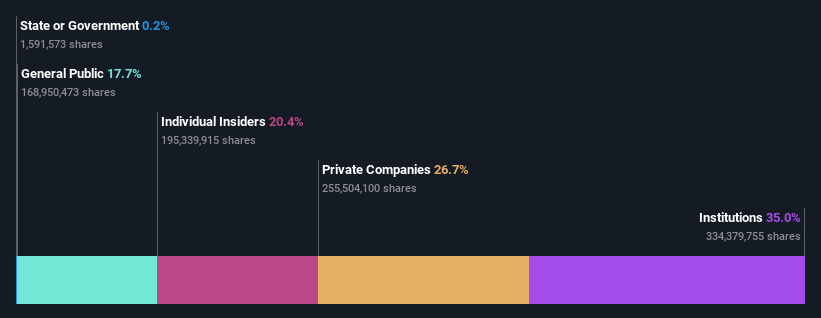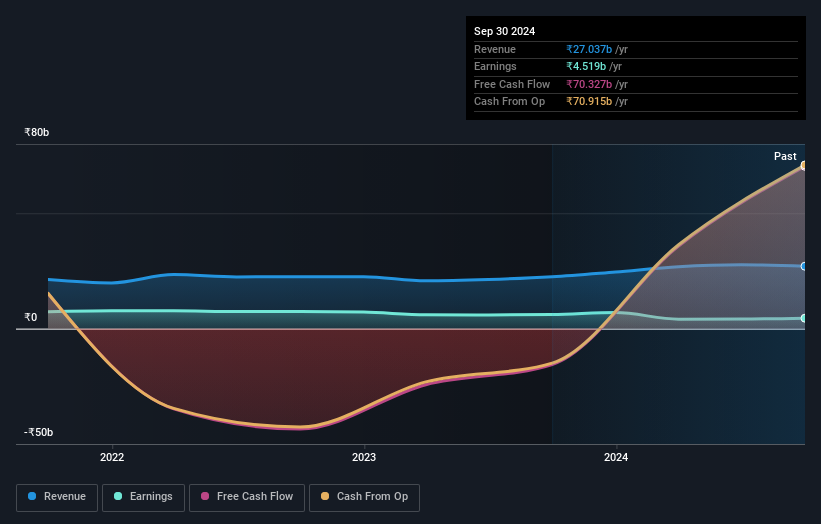- India
- /
- Capital Markets
- /
- NSEI:JMFINANCIL
JM Financial Limited's (NSE:JMFINANCIL) large institutional owners must be happy as stock continues to impress, up 4.4% over the past week
Key Insights
- Given the large stake in the stock by institutions, JM Financial's stock price might be vulnerable to their trading decisions
- A total of 3 investors have a majority stake in the company with 52% ownership
- 20% of JM Financial is held by insiders
To get a sense of who is truly in control of JM Financial Limited (NSE:JMFINANCIL), it is important to understand the ownership structure of the business. The group holding the most number of shares in the company, around 35% to be precise, is institutions. Put another way, the group faces the maximum upside potential (or downside risk).
Last week’s 4.4% gain means that institutional investors were on the positive end of the spectrum even as the company has shown strong longer-term trends. The gains from last week would have further boosted the one-year return to shareholders which currently stand at 64%.
In the chart below, we zoom in on the different ownership groups of JM Financial.
See our latest analysis for JM Financial

What Does The Institutional Ownership Tell Us About JM Financial?
Institutions typically measure themselves against a benchmark when reporting to their own investors, so they often become more enthusiastic about a stock once it's included in a major index. We would expect most companies to have some institutions on the register, especially if they are growing.
We can see that JM Financial does have institutional investors; and they hold a good portion of the company's stock. This suggests some credibility amongst professional investors. But we can't rely on that fact alone since institutions make bad investments sometimes, just like everyone does. If multiple institutions change their view on a stock at the same time, you could see the share price drop fast. It's therefore worth looking at JM Financial's earnings history below. Of course, the future is what really matters.

We note that hedge funds don't have a meaningful investment in JM Financial. The company's largest shareholder is JM Financial & Investment Consultancy Services Private Limited, with ownership of 24%. In comparison, the second and third largest shareholders hold about 17% and 11% of the stock. Additionally, the company's CEO Vishal Kampani directly holds 1.5% of the total shares outstanding.
To make our study more interesting, we found that the top 3 shareholders have a majority ownership in the company, meaning that they are powerful enough to influence the decisions of the company.
While studying institutional ownership for a company can add value to your research, it is also a good practice to research analyst recommendations to get a deeper understand of a stock's expected performance. We're not picking up on any analyst coverage of the stock at the moment, so the company is unlikely to be widely held.
Insider Ownership Of JM Financial
While the precise definition of an insider can be subjective, almost everyone considers board members to be insiders. The company management answer to the board and the latter should represent the interests of shareholders. Notably, sometimes top-level managers are on the board themselves.
I generally consider insider ownership to be a good thing. However, on some occasions it makes it more difficult for other shareholders to hold the board accountable for decisions.
It seems insiders own a significant proportion of JM Financial Limited. It is very interesting to see that insiders have a meaningful ₹27b stake in this ₹133b business. Most would be pleased to see the board is investing alongside them. You may wish to access this free chart showing recent trading by insiders.
General Public Ownership
The general public-- including retail investors -- own 18% stake in the company, and hence can't easily be ignored. This size of ownership, while considerable, may not be enough to change company policy if the decision is not in sync with other large shareholders.
Private Company Ownership
We can see that Private Companies own 27%, of the shares on issue. It's hard to draw any conclusions from this fact alone, so its worth looking into who owns those private companies. Sometimes insiders or other related parties have an interest in shares in a public company through a separate private company.
Next Steps:
While it is well worth considering the different groups that own a company, there are other factors that are even more important. Be aware that JM Financial is showing 6 warning signs in our investment analysis , and 1 of those is concerning...
Of course this may not be the best stock to buy. Therefore, you may wish to see our free collection of interesting prospects boasting favorable financials.
NB: Figures in this article are calculated using data from the last twelve months, which refer to the 12-month period ending on the last date of the month the financial statement is dated. This may not be consistent with full year annual report figures.
New: Manage All Your Stock Portfolios in One Place
We've created the ultimate portfolio companion for stock investors, and it's free.
• Connect an unlimited number of Portfolios and see your total in one currency
• Be alerted to new Warning Signs or Risks via email or mobile
• Track the Fair Value of your stocks
Have feedback on this article? Concerned about the content? Get in touch with us directly. Alternatively, email editorial-team (at) simplywallst.com.
This article by Simply Wall St is general in nature. We provide commentary based on historical data and analyst forecasts only using an unbiased methodology and our articles are not intended to be financial advice. It does not constitute a recommendation to buy or sell any stock, and does not take account of your objectives, or your financial situation. We aim to bring you long-term focused analysis driven by fundamental data. Note that our analysis may not factor in the latest price-sensitive company announcements or qualitative material. Simply Wall St has no position in any stocks mentioned.
About NSEI:JMFINANCIL
JM Financial
Provides various integrated and diversified financial services to corporations, financial institutions, government organizations, high net-worth individuals, and retail customers in India and internationally.
Solid track record with excellent balance sheet and pays a dividend.
Similar Companies
Market Insights
Community Narratives



